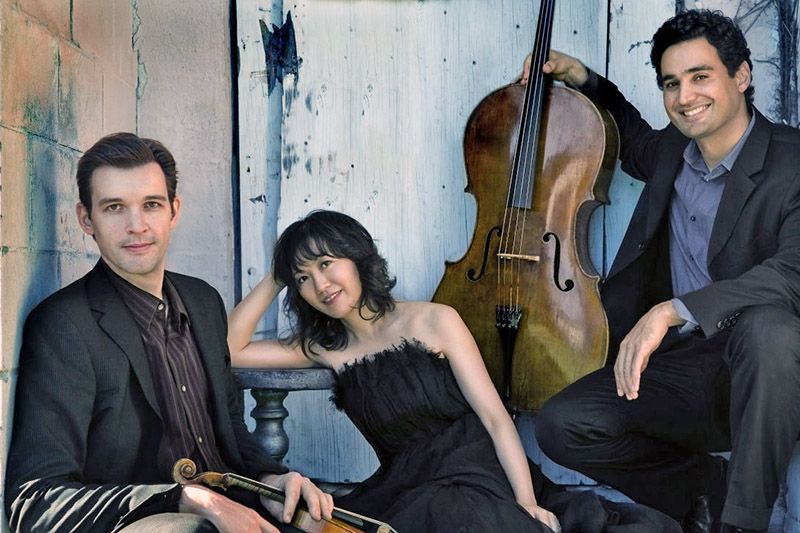
After going missing for an entire season, without even offering any streams, Woodstock’s venerable Maverick Concerts returned to operation on July 18th with the Horszowski Trio.
Some things have changed. Pre-pandemic, one just bought a ticket for Maverick, mostly in reduced-price books of ten. You could just walk up and buy a ticket. The same price got you seating anywhere inside the hall or in the outdoor section. In recent seasons, Maverick introduced premium-priced reserved seats, but otherwise you could still just walk up and buy a ticket. For most of us, that meant arriving an hour early and standing online until the hall opened. We got in a lot of chatting time with our neighbors!
For this season, and supposedly for this season only, ticketing is drastically different. All seats are reserved. Tickets are sold only in advance, on the internet or by phone. Prices are up considerably: $40 for the front half of the hall, $27.50 for the back half, $20 for outdoors ($10 for students). Only the first four weeks have been offered for sale so far. All audience members must show proof of vaccination to be admitted. (Some people may object to this provision; I regard it as proof of sanity.) Also, the traditional program book hasn’t been produced; all we got was a single sheet listing the program on the front and the donors on the back.
But Maverick still feels like Maverick. Long-term Music Director Alexander Platt hovered to offer his greetings and introductions. And the Horszowski Trio, making a return to the series, gave us an unusually adventurous and interesting program.

The concert began with a substantial novelty, the 1921 Piano Trio by Rebecca Clarke. I am familiar with some of Clarke’s music (particularly the Viola Sonata) but this work was new to me. At one time Clarke was accused of being a pseudonym for Ernst Bloch. Much of this Trio sounds rather like Bloch. But Clarke was a real presence on her own, and this piece has enough serious content to sustain its nearly half-hour length. The finale, showing signs of English folk tune influence, came to a rather abrupt and unsatisfying end, but it was the only weak moment in the piece.
The Trio’s pianist Rieko Aizawa produced a noticeably bright tone without ever grating. And the balance among the ensemble’s members, even with the piano lid all the way up, sounded flawless.
Maverick dedicated Schubert’s gorgeous Notturno in E-flat Major, D. 897, to the memory of Randall Craig Fleischer, Music Director of the nearby Hudson Valley Philharmonic and a splendid musician, who died suddenly last year at the age of 61. The dedication added even greater poignancy to this music.
I don’t suppose that Maverick would have been treated to several compositions by Russell Platt over the years if he weren’t the music director’s twin brother. But we’re fortunate in that connection, as Russell’s music has always proved satisfying. His two-year-old Trio by Nigth, a truly striking collage of small dramatic moments, eventually produces a powerful impression. The composer smilingly acknowledged the players.
Smetana’s Trio in G Minor, Op. 15, still qualifies as something of a novelty, although it shouldn’t. This pioneering nationalist composer wrote much more worthwhile music than just the Moldau and the From My Life String Quartet, splendid as those are. (I’d love to hear some enterprising string quartet offer his String Quartet No 2, a mysterious and strange piece.) I got to know the Smetana Trio decades ago from a recording by the Oistrakh Trio, but I haven’t heard it live in a tortoise’s age, if ever. The Horszowski Trio really leaned into its passionate sorrow, the fervency and wide dynamics reinforced by excellent balance.
Maverick is back! I’m looking forward to hearing the Miró Quartet play music of George Walker (who once performed at Maverick as a pianist), Kevin Puts, and Beethoven next Sunday.
A warning to attendees: the refreshment stand at Maverick is now offering only sweets, locally produced at Nancy’s Ice Cream, along with tea and coffee. They are delicious and very inexpensive, and thus unfairly tempting.
Leslie Gerber, who lives in Woodstock, New York, has been reviewing professionally since 1966, for such venues as Performance Today, Fanfare, and Amazon.com. He also publishes the Parnassus Records label.


